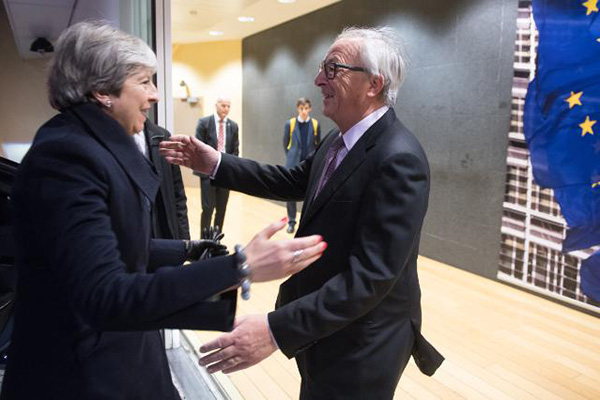
The agreement on the first phase points indirectly, by way of Ulster, to a soft Brexit, involving somehow remaining within the Single Market and the . But apart from leaving the EU, and without knowing clearly on what terms, the UK is devoid of a vision of its place in the world. The idea of ‘Global Britain’, much vaunted by Theresa May’s government, remains sketchy. It is an issue that has been debated far too little.
The obsession that Ortega y Gasset and others in Spain had with the need to develop a national project does not sit well with the British; little enamoured of grand principles, they are a people governed by a pragmatism that is not infrequently tempered by cynicism, but with the ability to look to the future in an attempt to mould it. It is not simply a question of an outward-facing national project, but also an inward-facing one. This too is lacking. The recent resignation of the government commission to combat inequality is a striking case in point. While the proponents of Brexit promised more social security and less inequality, this commission has reached the conclusion that the opposite is going to occur, unless May’s Conservative government does something to prevent it. Its chair, Alan Milburn, was drawn from Labour’s ranks, but his deputy on the commission was a Tory.
In the run-up to the next European Council meeting, when the UK and the EU square off to open the second round of negotiations, due to focus on the transition period after 29 March 2019 and determine the UK’s future relationship with the EU, the effort being expended in London on the immense labour that is Brexit is hindering the development of a more general project, regarding the type of society Britain wants to have and its place and role in the world. Indeed, the UK’s global influence has been absent since the Brexit referendum, which has obstructed any major diplomatic initiative emanating from London.
May has referred to her supposed vision for the future on various occasions, but in a superficial way. In her Lancaster House speech last January she claimed that the government had a Plan for Britain, which she encapsulated with the slogan ‘Global Britain’. ‘The great prize for this country – the opportunity ahead’, she said, ‘is to use this moment to build a truly Global Britain. A country that reaches out to old friends and new allies alike. A great, global, trading nation. And one of the firmest advocates for free trade anywhere in the world’. She did little to elaborate her vision in her Florence speech last September either, although she did say something no less important: Great Britain is leaving the EU, but not Europe, hence her call for a partnership that would also encompass security.
Clearly Global Britain will depend not only on itself but also on the relationship it forges with the EU, and the way US policies evolve, with Trump evolve or whatever comes in his wake (and when, because the President could be ousted or re-elected). Maximising free trade does not seem to appear on the current US Administration’s agenda. Moreover, relations between May and Trump have hit a sticky patch –the recent tussle over Jerusalem being a case in point– notwithstanding the special relationship that binds the two countries.
Facing the DUP, whose support she relies on in parliament, the machinations in her own Conservative Party to replace her and the pressure exerted by Jeremy Corbyn’s Labour Party, on the rise in the opinion polls, May is fighting for her own survival. But the Labour Party too has ducked an authentic debate on the issue, although Corbyn claims to support cooperating with the EU, and not just NATO, on military missions.
The Legatum Institute, an organisation that actively campaigns for a hard Brexit, has put forward a programme it calls ‘The country we want to be’ and has set out some proposals in a document entitled ‘The Brexit Inflection Point: The Pathway to Prosperity’. It is however baseless, as Martin Wolf in the Financial Times, and others, have pointed out, mainly because its premises are wrong (for example the claim that British membership of the EU has constrained world trade, that the World Trade Organisation is awaiting ‘UK leadership’, or that the government must not allow itself to be pressured by the calendar of Brexit talks, when just the opposite is evident). The report acknowledges the importance of the Brexit transition period post-2019 for the subsequent British contribution to a free trade world, but argues that what is currently on the table does not suffice. It calls for the UK to leave the single market and the EU customs union as a matter of urgency, on the grounds that this would maximise the rewards and minimise the costs of Brexit. Beyond Brexit there is no great vision worthy of the name. Rather, as Martin Sandbu points out, it is more a case of ‘pre-1914 nostalgia’.
Another pro-Brexit organisation, appropriately enough called Global Britain, has published a report along the same lines, calling for the global eradication of tariffs: ‘Going global without delay’. The problem is that the UK was globalising more within the EU. It remains to be seen what will happen when it leaves.
As has been noted recently, before joining the European Community in 1973 the UK was clear about what it wanted: to change Europe from within. It half-succeeded, applying the brake pedal more than the accelerator, in spite of which the EU’s advance has proceeded spectacularly, albeit not enough. Now London has lost this capacity even prior to completing Brexit. And it will have its work cut out changing the world once it is outside. Rule Britannia is a relic of the past, an imperial and colonial past that is incidentally rejected by significant percentage of younger UK citizens.
What is true however is that withdrawal –if it ever takes place– will require a major change in British foreign policy. But here there is very little creativity in the policy debate. There are academic exceptions, for instance the debates sponsored by Chatham House, the Royal Institute of International Affairs. In a recent lecture, its Deputy Chairman and former Permanent Under-Secretary at the Foreign Office, Sir Simon Fraser, started out by posing the question ‘What is the ambition?’. ‘Looking ahead’, he says, ‘we need to be clear-eyed about what we want’. He cites five priorities, in addition to relations with various countries and institutions: (1) upholding and adapting a system of relations based on rules, with the legitimate use of force when necessary; (2) addressing the challenge of the environment; (3) understanding and adapting to the global economy; (4) addressing the new security agenda (terrorism, cyber-security, proliferation, etc., issues on which the UK has much to contribute); and (59 finding collective responses to the challenge of demographic change and the movement of people, especially in Africa. But for all this, the UK is going to need the EU.
In other words, there are some experts who are thinking about the future outside the EU. But it does not seem to be a priority either for the government or the wider society. They are looking no further ahead than the Brexit bend in the road, the negotiations for which are undeniably proving difficult and complex. Perhaps the lack of vision regarding the future will end up generating more doubts among Britain’s citizens about Brexit. No-one knows.


